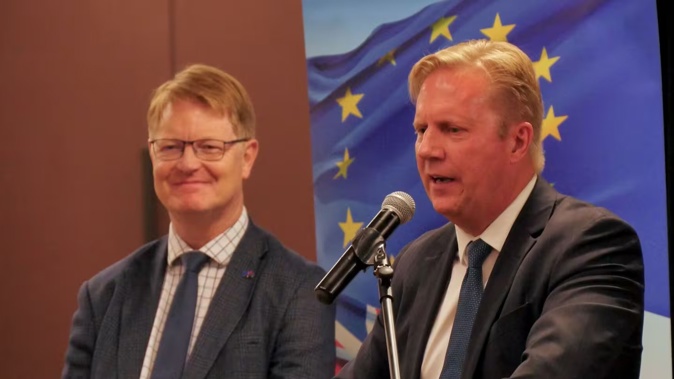
An extra $18,000 for kiwifruit growers and access to international funding to further develop a new line of sustainable sportswear.
These are two Bay of Plenty results of the European Union-New Zealand free-trade agreement, signed one year ago.
The EU’s Ambassador to New Zealand, Lawrence Meredith, visited Rotorua with Trade and Investment Minister Todd McClay this month, promoting the agreement (FTA) to businesses and marking its first birthday.
“A free-trade agreement is, at the end of the day, just a piece of paper,” Meredith said.
“We wanted businesses in New Zealand to know what the benefits are.”
He said the deal had resulted in the kiwifruit industry netting an additional $18,000 a year, per grower, since it was ratified in Parliament last May.
McClay, also MP for Rotorua, said exports of Kiwi goods to the EU surged by 28% in the first year of the FTA.
“In the last 12 months, our goods exports to the EU surged from $3.8 billion to over $4.8b.”
The FTA immediately removed 91% of duties on New Zealand exports, climbing to 97% after seven years. Wine, seafood and a range of other products also benefited from significant tariff reductions.
“Our growing network of trade agreements means exporters now have more choices about where to sell their world-class products,” McClay said.
While the FTA benefited agriculture and many of New Zealand’s primary industries, it also significantly focused on climate change and renewable energy.
Meredith said: “The European Union is globally leading on climate and renewable energies, an important part of the energy mix, much discussed here in New Zealand.”

Trade Minister Todd McClay with Prime Minister Christopher Luxon at Parliament earlier this month. Photo / Marty Melville
New Zealand was also seen as a big contributor in several industries, including finance and pharmaceutical technologies, “leading the globe” with rocket launches, he said.
“I‘ve been blown away by what‘s happening in aerospace and defence.”
He said the FTA would increase economic partnerships and offer exchanges of cultural and educational values.
During Meredith’s visit to Rotorua, he visited Crown Research Institute Scion, which specialises in forestry, industrial biotechnology and advanced manufacturing. It will soon be merged into the new Bioeconomy Science Institute.
Ambassador Meredith praised New Zealand's global leadership in rocket launches, led by companies such as Rocket Lab.
Scion also hosted members of Team Europe, a group of investors interested in New Zealand’s bioeconomy, which derives products, services and processes from natural resources such as wood.
Meredith said Scion scientists worked with five EU member states: Belgium, France, Italy, Portugal and Sweden.
One innovation to come out of the international collaboration was Scion developing sustainable sportswear.
It was made of electrically conductive textiles, creating high-performance clothing for biking, Scion chief operating officer Florian Graichen said.

The Scion building in Rotorua. Photo / RNZ
“So that is abrasion and tear-resistant, waterproof and ultimately biodegradable.”
The FTA meant Scion could tap into the $179b (€95b) Horizon Europe, a scientific research initiative to help develop sustainable living, Graichen said.
Scion always had a wide international network that allowed it to run multimillion-dollar, multi-year projects because funding could move freely across borders.
He said new opportunities arising from the FTA would allow New Zealand to contribute more.
New European funding also meant classic Kiwi ingenuity could be taken to the world stage.
“You take it from No 8 wire mentality to an industrialised process.”
There was an opportunity for future partnerships with industrial biotech, green technology and advanced manufacturing.
“How do we build the relationships for our tech, engineering, and other innovations - that will be interesting.”
Graichen said one of the more exciting aspects of the FTA was that the EU was keen to keep bioeconomy manufacturing jobs in New Zealand.
“That works extremely well.”
In a climate of increased trade tariffs, Meredith said NZ and the EU represented good, stable trading partners.
FTAs were vital for global economic security and the supply chain in an increasingly interconnected world.
“If you look at the full supply chain, for most industries, it’s global.”
Parts and ideas for various industries passed between countries, and finding trusted trade partners was essential.
Rotorua Mayor Tania Tapsell said the visit was mutually beneficial and allowed Rotorua businesses and industries to benefit from this connection.
“The FTA is meaningful because of the potential to save millions in tariffs on goods exported from NZ to the EU.”
The savings created opportunities for industries and businesses to grow, benefiting Rotorua’s economy.
Beyond trade relationships, Tapsell said the agreement offered a chance to strengthen cultural, sporting and educational exchanges.
Take your Radio, Podcasts and Music with you









